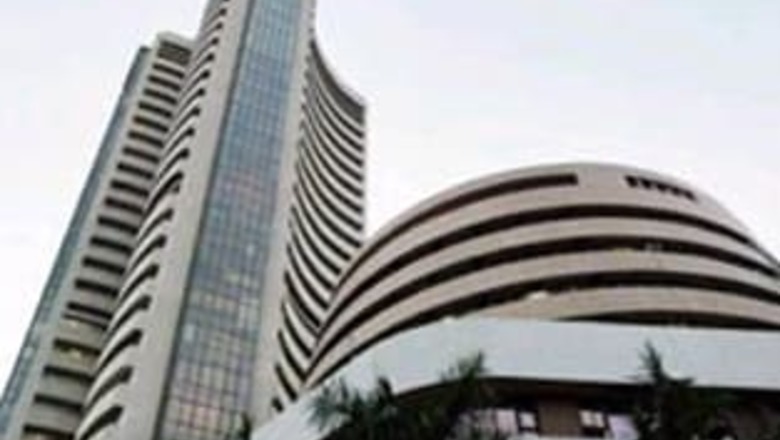
views
Alastair Newton of Nomura International said he is not optimistic on outcome of the G-20 meeting, but sees more fiscal stimulus from China and Japan. "I expect some uptick in emerging markets in second half of FY09."
He expects India's growth to bottom out at around 5-5.5 per cent by next quarter. "However, India can head back to 10 per cent growth if there is further round of reforms. Thus, I am bullish on India and see potential upside going ahead."
Even the market wants a pro-reform government going forward, he added.
Commenting on the upcoming elections, Newton said there is a lot of uncertainty about Indian elections, as these will be the most difficult elections ever seen.
According to Newton, Congress looks slightly better placed than BJP currently, but a third-front emergence with BSP is quite likely.
Here is a verbatim transcript of the exclusive interview with Alastair Newton on CNBC-TV18. Also watch the accompanying video.
Q: What is your sense of what may come out which could be construed as positive news for equity markets from the G-20 meeting?
A: I am not optimistic that we are going to get a huge amount out of the G-20 meeting on April 2. Finance Minister's meeting on Sunday - somewhat upbeat, but not a lot of substance in it - a long way to go and there is clear difference between the US and Europe. US is pushing for more fiscal stimulus, Europe is looking for market reform, so it's still not clear exactly where the emerging market stand in that. I would certainly expect to see more fiscal stimulus from China, possibly from Japan. Europe will be very cautious on that and for the US, the big question is the financial stability bill rather than further fiscal stimuli at this stage.
Q: Your report has suggested that you see this year as extremely important by way of international politics and its impact on markets. In that sense do you expect some kind of solution to be cobbled out of the financial crisis or even the banking crisis?
A: I am not sure that there is a policy solution per se. If I think back to the last big crisis in 1998 - when I was working for then Prime Minister, Tony Blair - policy makers were able to come up with the declaration out of G-7 which changed market sentiment. My sense this time looking at where the real economy is, is that we are probably going to have to do this the hard way and wait for the economy to turn before we see a turn of sentiment.
The good news from that perspective is that despite the dip which emerging markets have inevitably taken in a worldwide decoupling has proved to be something of a mess. Emerging markets do stand to do better than the Organization of Economic Co-operation and Development (OECD) countries and we would expect to see some uptick in emerging markets, particularly in the second half of this year including in India where we would expect growth to bottom out next quarter 5-5.1 per cent this year heading up towards seven per cent next year. Not great figures by this time since the last four years but still pretty good.
PAGE_BREAK
Q: How important would be the results of these elections, from a global investor's point of view, how closely would be the election out come be watched this time around?
A: The elections in India are very important indeed. I have been travelling around the world for the last two months, a lot of fund managers are interested in the Indian elections, a lot of uncertainty is surrounding its outcome and this is probably the most difficult Indian elections to call the outcome of which I have ever seen.
The two big factors which are weighing on the market's mind at the moment are - first of all the India-Pakistan relationship,the terrorist threat and lets hope we don't see a repetition of which Mumbai suffered at the back part of the last year. Secondly the possible emergence of the third front in Indian politics, the Mayawati factor. BJP, Congress both are very known quantities to the market, and if I look back over the last six to seven elections the outcome hasn't really figured strongly our market's sentiment depending if it was INC (Indian National Congress) or BJP(Bharatiya Janata Party) emerged as the ultimate winner.
But a government which was behold into a strong factor from the third front would be unknown to markets and the markets are slightly worried about a Mayawati communist collation in particular could mean for the economy going forward. What the markets really want to see is a pro-reform government, which is going to push forward on structural reforms after the elections and on top of my listed priorities would be pension reforms with a view of developing a corporate bond market in India, which seems to be to be a prerequisite to hard infrastructure development and the sort of ambitious nature which this Indian government and indeed the BJP clearly has in mind.
Q: The third front by themselves or by itself may not have the numbers to form a government but the likelihood or there is another possibility that either the Congress or the Bharatiya Janta Party (BJP) actually get supported by some members or constituents of the third front like the Left parties or Mayawati, would that be acceptable to the global fraternity or would that make them equally nervous?
A: We would want to look at the data for how it is going to work out. You are absolutely right, the third front is a coalition former rather than a king maker, looks to me to be pretty unlikely at the moment although who knows comes in the next general election after this one. But for the time being, it all depends on the post election bargaining between the various parties, which certainly going to see a multi-party coalition.
At the moment, Congress looks to be slightly better placed than BJP in terms of coalition negotiations, but a lot could happen after election depending which of those two emerge as a largest single party. Markets are going to look very carefree, indeed any talks which are going on between either of the two main parties and Mayawati and the Communist and if it looks like they are going to be in a swing position, then markets are going to be nervous if we see a clear break, where either Congress or BJP is going to pursue a pro reform agenda that is going to be very positive for market sentiment. At this stage it is too early to tell which way it is going to work out.
Q: At this point in time are you getting the sense that fund managers are holding on to their investment calls waiting for the election outcome and just as a corollary to that if the third front does emerge as a meaningful force in the government that comes to power, do you fear there might be large-scale outflows?
A: I don't think we are going to see large-scale outflows; India has a very positive story to tell - for the last few years been hit by the global financial crisis, there was inevitability about that sadly, but overall we still see terrific upside potential in India. We have a very bullish call from about fifteen months ago when we published the major study on India. We believe that India can head back towards 10 per cent per annum growth and hit 10 per cent per annum if we see a further round of structural reforms after the next election. Overall fund managers want to see India do well; they believe India can do well. As I say, those two factors just making people stand back a little bit and slightly cautious at the moment, the election out come and the India-Pakistan relation.


















Comments
0 comment